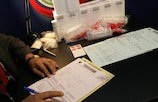UEFA anti-doping drive proves its worth
Monday, September 15, 2014
Article summary
Through a combination of testing and education, UEFA's anti-doping programme is helping to protect the integrity of Europe's club and international competitions.
Article top media content

Article body
As the group stages of the UEFA Champions League and the UEFA Europa League get under way again, and the UEFA EURO 2016 qualifying programme commences, UEFA's anti-doping programme, through a combination of testing and education, is protecting Europe's major club and international competitions.
2013/14 season
Last season, UEFA collected 2,198 samples (1,860 urine and 338 blood) across all its competitions, with 1,698 of them (1,360 urine and 338 blood) collected in the UEFA Champions League and UEFA Europa League. In the UEFA Champions League, samples were collected both in- and out-of-competition. There were no positive cases in either of these competitions. In other competitions, UEFA collected 500 urine samples.
WADA anti-doping testing statistics for 2013
The World Anti-Doping Agency (WADA) has published its worldwide anti-doping testing figures for 2013. The figures demonstrate the leading role that UEFA is playing in the fight against doping. As in 2012, the testing figures have been compiled entirely from the Anti-Doping Administration and Management System (ADAMS), the system through which all WADA-accredited laboratories report their positive and negative findings.
The main points of the 2013 testing statistics are as follows:
• Worldwide, 269,878 tests were done in 2013.
• More tests were done in football (28,002) than in any other sport.
• UEFA carried out more tests (1,932) than any other regional sports organisation, and only four international sports federations did more.
• Rates of adverse analytical findings (AAFs) in football (0.48%) are among the lowest of any sport. However, it is important to note that the number of confirmed anti-doping rule violations is lower than the number of AAFs, because all AAFs are subject to a results management process which includes, for example, checking whether the player who provided the sample has a valid therapeutic use exemption (TUE) for the prohibited substance detected.
• UEFA had three AAFs out of the 1,932 tests it conducted (0.16%). After appropriate investigation, only one AAF was treated as an anti-doping rule violation (cocaine; futsal player suspended for 18 months).
Overall, UEFA carried out 1,932 tests in 2013 – 1,846 urine (1,373 in-competition and 473 out-of-competition) and 86 blood (36 in-competition and 50 out-of-competition). Additional analysis was performed on many of those samples: 616 tests for EPO, 39 GC/C/IRMS (which looks for steroid doping), as well as ten tests for hGH.
The full WADA testing figures are available here
Doping Control Officers
UEFA's anti-doping programme would not be possible without its doping control officers (DCOs), the 45 doctors from 24 different countries who conduct doping controls in UEFA competitions.
At the end of June, UEFA held a workshop for 20 candidates from 12 different countries, who were starting the training programme to join UEFA's panel of DCOs. The candidates spent two days at UEFA's headquarters in Nyon, where they attended a mix of lectures and demonstrations from UEFA's anti-doping unit staff and experienced UEFA DCOs. Afterwards the candidates underwent a series of practical tests and written exams.
The candidates who passed this first stage of the training programme now move on to the second stage, which involves watching an experienced DCO conduct a doping control at a UEFA match, and then conducting at least one doping control themselves under the supervision of an experienced DCO. If the candidates are successful at the second stage of the training programme, they will join UEFA's 45 experienced DCOs and start testing all over Europe.
The DCOs had their own seminar at the end of July. The seminar, held over two days in Geneva, featured lectures, discussions, practical sessions and a written exam, and aimed to ensure that UEFA's DCOs are all performing to the very highest standards as they conduct the tests which contribute to making UEFA's anti-doping programme one of the best in world sport.
Education
Over the summer, UEFA's anti-doping unit staff held education sessions for each team at UEFA's youth competitions. The sessions, with simultaneous interpretation into each team's language, teach the players about anti-doping rules, the risks that could lead to an accidental positive test, and the danger which doping poses to players' health. In addition, UEFA distributed some 25,000 educational leaflets, in seven different languages, to all the participants of this season's UEFA competitions.







